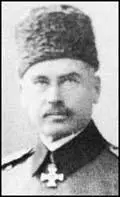Otto Liman von Sanders

Otto Liman von Sanders was born in 1855. He served in staff and divisional commands before becoming head of the German military mission to Turkey in 1913. Despite Russian protests, Sanders became Inspector General of the Turkish Army in January, 1914.
Sanders became commander of the Turkish First Army but in March 1915, was replaced by Baron von der Goltz. Sanders was now sent to the Dardanelles with the Fifth Army and was credited with masterminding the Allied defeat at Gallipoli. He was interviewed by Raymond Gram Swing of the Chicago Daily News: "The lunch with General von Sanders and his staff was not informative. The General was terse and reticent. He did not like strangers about. I am sure he did not like Americans. But he did speak his praise for his Turkish troops and said he had no doubt that the Allies would not be able to get through. If they had landed a few days before March 18, he said, they would have found only light forces below the narrows and no heavy ones above them. The story then would have been different. But he had been given time to bring up reinforcements and prepare his positions."
In February, 1918, Sanders took command of the Turkish-German Army on the Palestine Front but was defeated by General Edmund Allenby and his much larger army. After the Armistice Sanders was arrested by the British as a war criminal but was released in August 1919.
Otto Liman von Sanders died in 1929.
Primary Sources
(1) Raymond Gram Swing, Good Evening (1964)
A nine-mile walk on horseback is not an ordeal, but it is an undertaking, and I was glad when we arrived at Liman von Sanders's headquarters. Here we went through the formalities of introductions and partook of refreshments, but with the lesser lights. We were not to meet the Commander till lunch. Then we were taken into the trenches.
Both sides were thoroughly dug in by this time. It was like the stalemate on the Western front. The trenches were well built, deep, and adequately protected. The Turks, we were told, made admirable soldiers, a fact which is now universally known. But before the Gallipoli landing, it had not been known or acknowledged, and to a certain extent had not been true. The Liman von Sanders mission arrived well before the war, and though, as I was to learn, he was not a sociable man, he was a great organizer and trainer of troops. He had zealous support from Enver and Kemal, and the Turkish army was soon to be the equal of any in the kind of warfare that had developed.
We walked for a couple of hours in the trenches, being permitted to come to the point closest to the Allied trenches, the precise distance of which was not a stone's throw away from the Anzacs. If I had shouted over to them from the top of the trench, they would have heard me. We had come on a quiet day. No gunfire went off while we were in the trenches and no grenades were thrown. Now and again, a single plane overA head dropped a few bombs, apparently on Liman von Sanders's headquarters. The soldiers we passed were grimy, and for the greater part were taking their ease, lying on their blankets or leaning against the trench side.
The lunch with General von Sanders and his staff was not informative. The General was terse and reticent. He did not like strangers about. I am sure he did not like Americans. But he did speak his praise for his Turkish troops and said he had no doubt that the Allies would not be able to get through. If they had landed a few days before March 18, he said, they would have found only light forces below the narrows and no heavy ones above them. The story then would have been different. But he had been given time to bring up reinforcements and prepare his positions.
Our visit was made after a heavy and costly Turkish attack on May 18 and a remarkable armistice arranged after it to allow the gathering of the wounded and the burial of the dead on both sides. I do not now recall that this unusual event and the great battle were even mentioned at the meal. We were told little more than that General von Sanders was sure that the Allies could not get through, which proved to be true.
